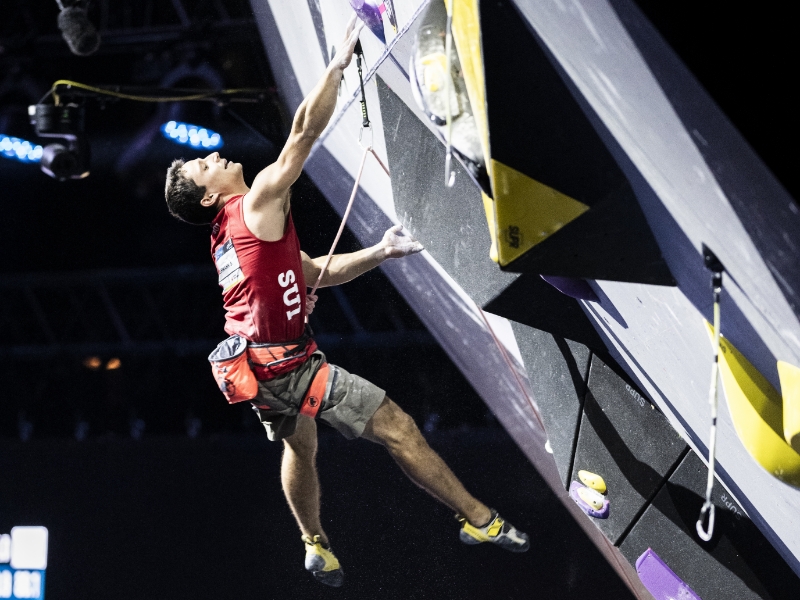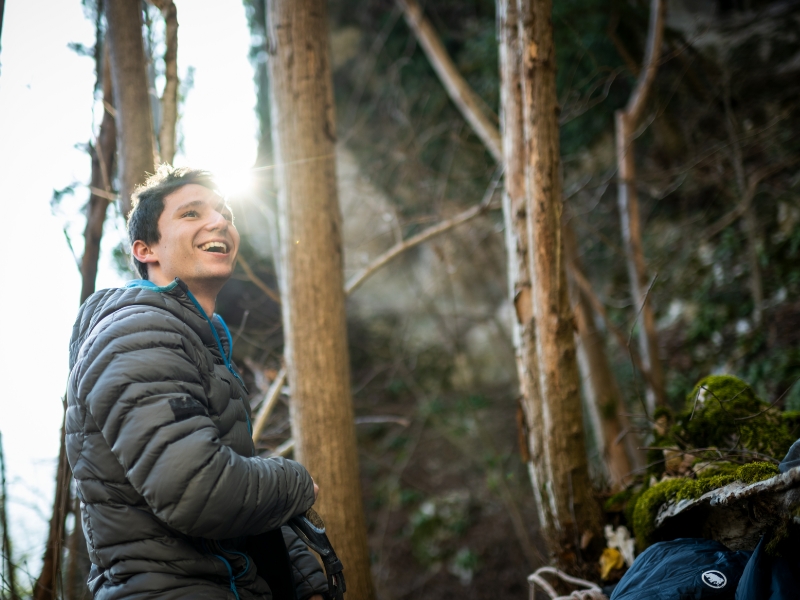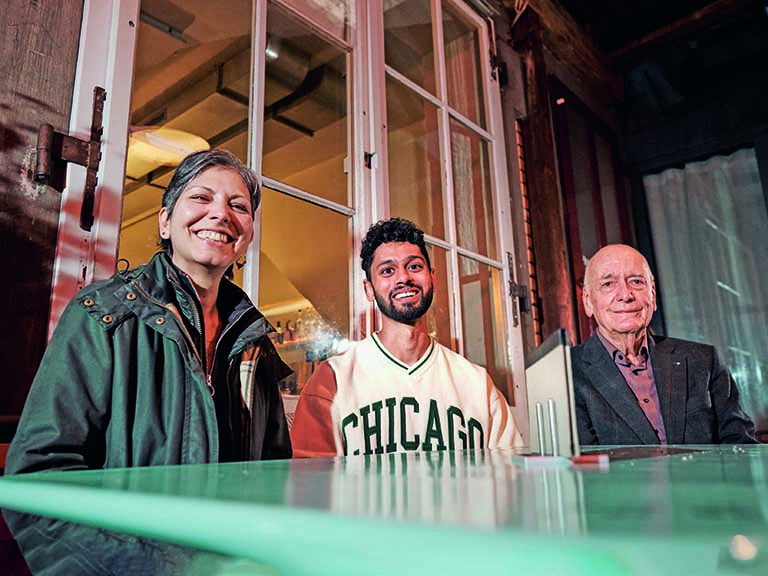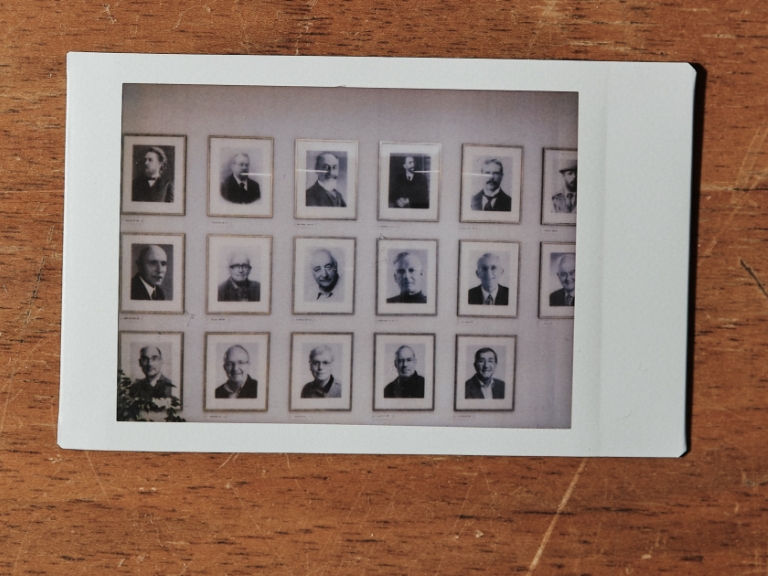Top athlete Sascha Lehmann
From the climbing wall to the lecture course
The European champion in lead climbing and Olympic participant maintains a balance between top athletic performance and intellectual inquisitiveness. How does he manage to combine his passion for climbing with a challenging course of study at the University of Bern? A glimpse into the everyday life of the athlete.

He’s highly focused because everything is at stake. He puts his hands into the bag with the magnesia powder to keep his hands dry, then attempts the next handhold. He swings his foot to the next foothold to find stability. He secures his rope and then tackles the next section on the wall. The clock is ticking, he has to climb as far up the wall as possible within the allotted time.
From the Olympic Games to European Champion
Sascha Lehmann is in the middle of the competition. It’s about the European Combined Championship, a discipline in competitive climbing. He ends up runner-up European champion, exactly one day after winning the Lead European Championship title for Switzerland. He travels straight home from Villars-sur-Ollon after his runner-up title, and a few days later he travels to the next World Cup station in Slovenia.
The Olympic Games as a career highlight
It is precisely during this short break that I meet Sascha Lehmann. The highlights of the year are behind him. On the one hand, there were the Olympic Games: “Paris was an experience I will remember for a long time to come. From a sporting point of view, it wasn’t quite what I had hoped for. Still, I’ll take with me the great atmosphere, which motivated me incredibly and encouraged me in my development,” says Lehmann, summing up the competitions.
Climbing as a calling
Climbing is more than just a sport for Lehmann. Through his family, he came into contact with this fascinating discipline at an early age, but was also active in artistic gymnastics, among other things. “For me, gymnastics was an ideal basis for climbing, as you work on many muscle groups and have to be really confident about the movements in both sports. This requires a lot of concentration,” he explains. In the end, he opted for climbing: “It’s varied and you can always try out new movements. Every wall is different and there’s always something to discover.”
“Finding solutions is in my blood.”
Sascha Lehmann
In the conversation, Lehmann appears satisfied and not stressed by his busy schedule. I ask him how that can be: “Finding solutions is in my blood,” he says of himself. This is why, despite his career as a sports professional, he decided to study physics as a major and computer science and mathematics as a minor.
The University of Bern as an enabler for top-class sport
It was clear to Sascha Lehmann when he was at school that he would study after finishing his baccalaureate. Back then he spent a long time considering which subject to study and where to study it. In doing so, he came across the University of Bern’s “Top-Class Sport and Studies” offer.

“Top-Class Sport and Studies” at the University of Bern
As part of this program, the University supports proven top-class athletes so that they can combine study and sport in the best possible way. The plan of studies can be adapted flexibly with the respective faculties. Only those in possession of a Swiss Olympic Card can agree on a more flexible course of study. The Swiss Olympic Card for athletes is an award for competitive achievements on an international scale and/or for existing potential to successfully tackle a path as an athlete. However, athletes from non-Olympic sports can also be included in the program if confirmed by the respective association.
Everything for top performance
This is how Sascha Lehmann experienced it, as he explains to me: In order to focus on his previous career highlight as a competitive climber, he took a position as a sports soldier and took leave of absence from his studies. With this position, he was able to earn a living during this time and concentrate on preparing for the Olympic Games: In the morning, he spent around two hours in the gym, and in the afternoon he spent four hours climbing the wall. During this time, he could not neglect rest or sleep either. In other words, these are ideal conditions to prepare for the Games.
Magazine uniFOKUS

Studying as a launchpad
This article first appeared in uniFOKUS, the University of Bern print magazine. Four times a year, uniFOKUS focuses on one specialist area from different points of view. Current focus topic: Studies
Subscribe to uniFOKUS magazineMore time for training thanks to flexibility
He is returning to his studies with an adjusted schedule for the fall semester 2024/2025. First of all, he would like to study part-time (50%) so that he can continue to pursue competitive sport alongside his studies: “Up to now, I have almost always been able to find a good solution with my contacts,” says Lehmann, optimistic about the further course of study. “I discuss this directly with the lecturers when it comes to exams, submitting semester papers or attending lecture courses.” With the exception of one exam, this always worked well. “Unfortunately, we couldn’t find a solution for an exam that was supposed to take place shortly before an important competition. So I took the exam and then had to travel to the competition later than I would have done normally.”
“Up to now, I have almost always been able to find a good solution with my contacts.”
Sascha Lehmann
Above all, the availability of podcasts is of great help to him: “It makes it a lot easier to advance my athletic career when I travel to Asia and then listen to the lecture as a podcast,” he explains. Lehmann, who began his studies during the coronavirus pandemic, is looking forward to the fall semester because then he can build up his network with other students: “I’ve already completed a third of my studies. Now it’s about finding my own rhythm. I want to spend a lot of time at the University so that I can establish my network.”
The next big goal already in sight
Sascha Lehmann is well prepared and is organizing his return to studying. While he is now focusing more on learning, he still has the next sporting goal at the back of his mind, as he tells me at the end of our interview: “The Olympic Games in Los Angeles 2028 are certainly a big goal for me. I would love to win a medal there. By then, I could also have completed my bachelor’s degree program. Then I’ll see you in the master’s degree program because that’s the next academic step I would like to take!”
Subscribe to the uniAKTUELL newsletter

Discover stories about the research at the University of Bern and the people behind it.


